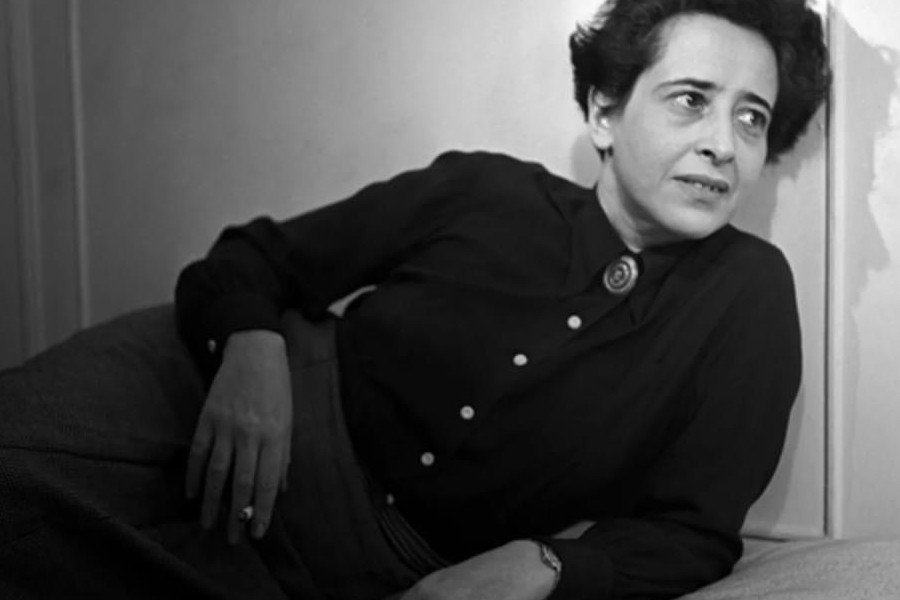The first full-time female professor: Who is Hannah Arendt?
Arendt criticized the liberal understanding of freedom in Western societies and argued that true freedom cannot develop in an environment that equates happiness with material well-being.

Hannah Arendt (October 14, 1906 – December 4, 1975) was a German-born Jewish-American political scientist. Although known to many as a philosopher, she rejected this title, saying that philosophy deals with problems of "the individual herself."
The reason why she wants to be defined as a political scientist is that her work is focused on "not the human being as a singular, but the humanity that inhabits the world and covers the world".
Arendt was born on 14 October 1906 in Hanover, the only child of a Jewish engineer. She grows up in Berlin. At the age of 18, she began to study philosophy with Martin Heidegger in Marburg. She falls in love with Heidegger intellectually and passionately. In this process, the world of thought will expand as much as possible.
She completes her university education in Marburg and Freiburg and goes to Heidelberg to complete her doctorate with Karl Jaspers… She was only twenty-two when he completed her doctorate. Between the years 1924-1929, she meets the famous thinkers of the period, receives education, influences them, and is influenced by them. She studied philosophy, theology, and Greek with Martin Heidegger and Rudolf Bultmann in Marburg, Edmund Husserl in Freiburg, and Karl Jaspers in Heidelberg.
FIRST FULL-STAFF FEMALE PROFESSOR
In 1933, when Hitler came to power, she left Germany and went to France. Arendt, who had to flee to Paris, meets Walter Benjamin and befriends her. She is actively involved in the Jewish immigrant movement in Paris. During World War II, she was forced to flee France as Jews were sent to concentration camps as a result of the German military forces' occupation of parts of France.
She married the German poet and philosopher Heinrich Blücher in 1940. In 1941, she went to the USA with her husband, settled there, and became a US citizen. During her first years in the US, she had a hard time finding an academic job. In 1953, she was invited to the Christian Gauss conferences at Princeton. She became the first full-time female professor in 1959. Thus, Arendt has a distinguished academic career with her lectures at universities such as California, Chicago, Columbia, Northwestern, and Cornell.
“THE STATE HAS THE MOST POWERFUL TOOLS OF VIOLENCE”
She was a professor of philosophy at the New School for Social Research in New York when she died in 1975 at the age of 69. Hannah Arendt has both political and emotional background and within her unique line of thought, violence, power, revolution, totalitarianism, equality-inequality, freedom, politics, philosophy, human, action, thought, truth, morality, rhetoric, ideology, culture, she works on democracy, nationalism, racism, state, party, regime, human rights, antisemitism, imperialism, art, public sphere.
Arendt particularly focuses on violence and its source. It bases violence on tools used, not numbers or opinions. According to her, violence always needs tools and always contains an element of arbitrariness. And the state is a central authority that wields the most powerful means of violence. Arendt explains that sometimes violence is not unnecessary and sees it as a human condition:
“No one questions violence when it is carried out in self-defense. For violence is not only obvious, but it is also present, and the end that justifies the means is right there.” And she adds, “A Jew must defend himself if he is being abused as a Jew.”
FREEDOM DISCUSSION
The development that made Arendt's discussion all over the world is the thoughts she wrote in the trial of Adolf Eichmann, who was specially assigned to solve the Jewish problem under the command of Gestapo chief Heydrich. Arendt's works are about power, subjects of politics, authority, and totalitarianism. Much of her work has focused on affirming the concept of freedom, which is synonymous with collective political action among equals.
Arendt, who opposes the liberal assumption that "where politics ends, freedom begins", grounds freedom as a concept of public and togetherness, giving examples from ancient Greek city-states, American towns, Paris Commune, social freedom movements in the 1960s, and other areas.
One of her most important works is “The Human Condition” (1958), in which she provocatively reveals the differences between labor, work, and action and the important consequences of these differences. She elaborates her theory of political action thoroughly in this work.
In her first major work, The Origins of Totalitarianism, she examined the origins of Communism and Nazism and the links between them and antisemitism. This book has caused quite a bit of controversy because it attempts to compare two, irreconcilable issues.
Describing the Eichmann case in The New Yorker, which would later become the book Eichmann in Jerusalem, she asked the question of whether evil is something fundamental and fundamental, or simply the banality of humans—the result of ordinary people obeying the orders of others and obeying the majority view without considering the consequences of their actions or inaction. Her last book, The Life of the Mind, was left unfinished when she died.
